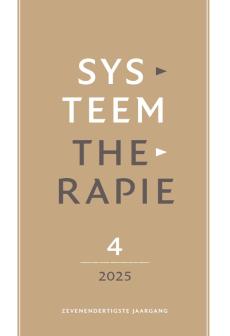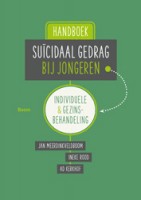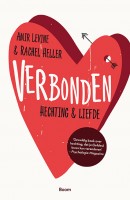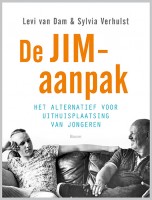Cognitief-gedragstherapeutische interventies in relatietherapie
Samenvatting
In de voorbije jaren werd in de systeemtherapie de cognitief-gedragstherapeutische benadering gedurende lange tijd ‘verdrongen’ door meer populaire stromingen, zoals de cybernetische en transgenerationele systeembenadering. Echter, vooral in de afgelopen twee decennia is de effectiviteit van een cognitief -gedragstherapeutische aanpak bij relatietherapie steeds duidelijker geworden. Dit is vooral te danken aan positieve onderzoeksresultaten en het potentieel van deze benadering voor integratie met andere therapievormen. Dit artikel biedt een actueel overzicht van het gebruik van cognitief-gedragstherapeutische technieken met paren en sluit af met een blik op de toekomst.
Literatuur
- Barelds, D.P.H., Luteijn, F. & Arrindell (2003). Nederlandse Relatievragenlijst. Lisse: Swets & Zeitlinger. Baucom, D.H. (1987). Attributions in distressed relations: How can we explain them? In: S. Duck & D. Perlman (eds.), Heterosexual relations, marriage and divorce (pp. 177-206). Londen: Sage.
- Baucom, D.H. & Epstein, N. (1990). Cognitive-behavioralmarital therapy. New York: Brunner/Mazel. Baucom, D.H., Epstein, N., Rankin, L.A. & Burnett, C.K. (1996). Assessing relationship standards: The Inventory of Specific Relationship Standards. Journal of Family Psychology, 10, 72-88.
- Baucom, D.H., Epstein, N., Sayers, S. & Sher, T.G. (1989). The role of cognitions in marital relationships: Definitional, methodological, and conceptual issues. Journal of Consulting and Clinical Psychology, 57, 31-38. Baucom, D.H., Shoham, V., Mueser, K.T., Daiuto, A.D. & Stickie, T.R. (1998). Empirically supported couples and family therapies for adult problems. Journal of Consulting and Clinical Psychology, 66, 53-88.
- Beck, A.T. (1988). Love is never enough. New York: Harper & Row.
- Beck, A.T., Rush, A.J., Shaw, B.F. & Emery, G. (1979). Cognitive Therapy of Depression. New York: Guilford.
- Beck, J.S. (1995). Cognitive therapy: Basics and beyond. New York: Guilford Press.
- Blankstein, H. (1999). Boekbespreking van: Case studies in couple and family therapie, F.M. Dattilio (1998). Systeemtherapie, 11, 253-256.
- Bradbury, T.N. & Fincham, F.D. (1990). Attributions in marriage: Review and critique. Psychological Bulletin, 107, 3-33.
- Dattilio, F.M. (1989). A guide to cognitive marital therapy. In: P.A. Keiler & S.R. Heyman (eds.), Innovations in clinical practice: A source book (Vol. 8, pp.27-42). Sarasota, FL: Professional Resource Exchange.
- Dattilio, F.M. (1993). Cognitive therapy with couples and families. The Family Journal, 1(1), 51-65.
- Dattilio, F.M. (1994). Families in crisis. In: F.M. Dattilio & A. Freeman (eds.), Cognitive-behavioral strategies in crisis intervention (pp.278-301). New York: Guilford Press.
- Dattilio, F.M. (1997). Family therapy. In: R.L. Leahy (ed.), Practicing cognitive therapy: A guide to interventions (pp.409-450). Northvale, NJ: Jason Aronson.
- Dattilio, F.M. (1998). Case studies in couples and family therapy: Systemic and cognitive perspectives. New York: Guilford.
- Dattilio, F.M. (2001). Cognitive-behavioral family therapy: contemporary myths and misconceptions. Contemporary Family Therapy, 23(1), 3-18.
- Dattilio, F.M. (2002). Homework assignments in couple and family therapy. Journal of ClinicalPsychology, 58(5), 570-583.
- Dattilio, F.M. & Epstein, N.E. (2003). Cognitive-behavioral couples and family therapy. In: G. Weekes, T.L. Sexton & M.S. Robbins (eds.), The family therapy handbook (pp.147-175). New York: Brunner/Routledge.
- Dattilio, F.M., Epstein, M.B. & Baucom, D.H. (1998). Introduction to cognitive-behavior therapy with couples and family. In: F.M. Datillio (ed.), Case studies in couple and family therapy: Systemic and cognitive perspectives (pp. 1-36). New York: Guilford Press.
- Dattilio, F.M. & Padesky, C.A. (1990). Cognitive therapy with couples. Sarasota, FL: Professional Resource Press.
- Ellis A. (1977). The nature of disturbed marital interactions. In: A. Ellis & R. Grieger (eds.), Handbook of rational-emotive therapy (pp.170-176). New York: Springer.
- Ellis, A. (1986). Rational-emotive therapy applied to relationship therapy. Journal of Rational-Emotive Therapy, 15(1), 4-21.
- Ellis, A. & Harper, R.A. (1961). A guide to rational living. Englewood Cliffs, NJ. Prentice Hall.
- Ellis, A., Sichel, J.L., Yeager, R.J., DiMattia, DJ. & DiGiuseppe, R. (1989). Rational-emotive couples therapy. New York: Pergamon Press.
- Epstein, N. (1992). Marital therapy. In: A. Freeman & F.M. Dattilio (eds.), Comprehensive casebook of cognitive therapy (pp.267-275). New York: Plenum Press.
- Epstein, N. & Baucom, D.H. (1989). Cognitive-behavioral marital therapy. In: A. Freeman, K.M. Simon, L.E. Beutier & H. Arkowitz (eds.), Comprehensive handbook of cognitive therapy (pp.491-513). New York: Plenum Press.
- Epstein, N. & Baucom, D.H. (2002). Enhanced cognitive-behavioral therapy for couples: A contextual approach. Washington DC: American Psychological Association.
- Epstein, N. & Eidelson, RJ. (1981). Unrealistic beliefs of clinical couples: Their relationship to expectations, goals and satisfaction. American Journal of Family Therapy, 9(4), 13-22.
- Fincham, F.D., Beach, S.R.H. & Nelson, G. (1987). Attribution processes in distressed and nondistressed couples: 3. Causal and responsibility attributions for spouse behavior. Cognitive Therapy and Research, 11, 71-86.
- Haley, J. & Hofman, L. (1967). Techniques of family therapy. New York: Basic Books.
- Hendrickx, J., Boeckhorst, F., Compernolle, T. & Pas, A. van der (1998). Handboek Gezinstherapie. Houten/Diegem: Bohn Stafleu Van Loghum.
- Hout, G.C.M, van (2002). Maken we er iets van? Samen je relatieproblemen in kaart brengen en oplossen. Lisse: Swets & Zeitlinger.
- Hout, G.C.M, van (submitted). Probleemoplossende cognitief-gedragstherapeutische relatietherapie. Gedragstherapie.
- Jacobson, N.S. & Christensen, A. (1996). Integrative couple therapy: Promoting acceptance and change. New York: Norton.
- Jacobson, W.S. & Margolin, G. (1979). Marital therapy: strategies based on social learning and behavior exchange principles. New York: Bruner Mazel.
- Johnson, S.M. & Denton, W. (2002). Emotionally focused couple therapy: Creating secure connections. In: A.S. Gurman & N.S. Jacobson (eds.), Clinical handbook of couple therapy 3r" ed. (pp.221-250). New York: Guilford Press.
- Kelly, G.A. (1955). The psychology of personal constructs. New York: Norton.
- Lange, A. (1995). De IPOV (Interactionele Probleem Oplossings Vragenlijst). Gedragstherapie, 28, 41-46.
- Lange, A. (2000). Gedragsverandering in gezinnen. Groningen: Wolters-Noordhoff.
- Lange, A. & Duurland, C. (1996). Gezinstherapie en Gedragstherapie. Het perfecte huwelijk. Systeemtherapie, 8(1), 4-16.
- Leahy, R. (1996). Cognitive therapy: Basic principles and applications. Northvale, NJ: Jason Aronson.
- Minuchin, S. (1974). Families and family therapy. Cambridge, MA: Harvard University Press.
- Nichols, M.P. & Schwartz, R.C. (2001). Family therapy: Concepts and methods 5tn ed. Boston: Allyn and Bacon.
- Satir, V. (1964). Conjoint family therapy. Californië: Science and Behavior Books.
- Schaap, C.P.D.R., Widenfelt, B.M. & Gerlsma, J. (2002). Behandelprotocol bij relatieproblematiek. Nijmegen: Cure & Care Publishers.
- Snyder, D.K., Cavell, T.A., Heffer, R.W.Mangrum, L.F. (1995). Marital and family assessment: A multifaceted, multilevel approach. In: R.H. Mikesell, D.D. Lusterman & S.H. McDaniel (eds.), Integrating family therapy: Handbook of family psychology and systems theory (pp.63-182). Washington, DC: American Psychological Association.
- Stuart, R.B. (1980). Helping couples change: A social learning approach to marital therapy. New York: Guilford Press.
- Thibaut, J.W. & Kelley, H.H. (1959). The social psychology of groups. New York: Wiley.
- Vansteenwegen, A. (2002). Liefde is een werkwoord. Tielt: Lannoo.
- Ven, J-P van de, Schrieken, B. & Lange, A. (2000). Ruzie met je partner - en wat je er aan kunt doen. Amsterdam: Nieuwezijds.
- Weiss, R.L. (1984). Cognitive and strategie interventions in behavioral marital therapy. In: K. Hahlweg & N.S. Jacobson (eds.), Marital interaction: Analysis and modification (pp.309-324). New York: Guilford Press.
 © 2009-2026 Uitgeverij Boom Amsterdam
© 2009-2026 Uitgeverij Boom Amsterdam
ISSN 0924-3631
De artikelen uit de (online)tijdschriften van Uitgeverij Boom zijn auteursrechtelijk beschermd. U kunt er natuurlijk uit citeren (voorzien van een bronvermelding) maar voor reproductie in welke vorm dan ook moet toestemming aan de uitgever worden gevraagd:
Behoudens de in of krachtens de Auteurswet van 1912 gestelde uitzonderingen mag niets uit deze uitgave worden verveelvoudigd, opgeslagen in een geautomatiseerd gegevensbestand, of openbaar gemaakt, in enige vorm of op enige wijze, hetzij elektronisch, mechanisch door fotokopieën, opnamen of enig andere manier, zonder voorafgaande schriftelijke toestemming van de uitgever.
Voor zover het maken van kopieën uit deze uitgave is toegestaan op grond van artikelen 16h t/m 16m Auteurswet 1912 jo. Besluit van 27 november 2002, Stb 575, dient men de daarvoor wettelijk verschuldigde vergoeding te voldoen aan de Stichting Reprorecht te Hoofddorp (postbus 3060, 2130 KB, www.reprorecht.nl) of contact op te nemen met de uitgever voor het treffen van een rechtstreekse regeling in de zin van art. 16l, vijfde lid, Auteurswet 1912.
Voor het overnemen van gedeelte(n) uit deze uitgave in bloemlezingen, readers en andere compilatiewerken (artikel 16, Auteurswet 1912) kan men zich wenden tot de Stichting PRO (Stichting Publicatie- en Reproductierechten, postbus 3060, 2130 KB Hoofddorp, www.cedar.nl/pro).
No part of this book may be reproduced in any way whatsoever without the written permission of the publisher.
Nieuwsbrief Boom Psychologie
Meld u nu aan en ontvang maandelijks de Boom Psychologie nieuwsbrief met aantrekkelijke aanbiedingen en de nieuwe uitgaven.
Aanmelden



